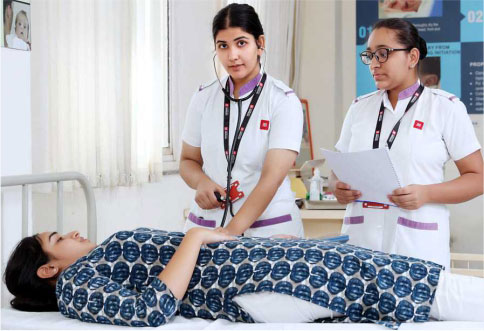
After BSc Nursing Which Course is Best
However, the learning doesn’t stop there. With the growing demand for specialized skills in nursing, many professionals often wonder, “What’s next after B.Sc Nursing?”
This blog explores the best courses to pursue after completing a B.Sc Nursing course, helping you decide the right path to enhance your career prospects.
Why Consider Further Studies After B.Sc Nursing?
Healthcare is an ever-evolving field, and nursing professionals must keep up with advancements to provide the best care to patients. Postgraduate courses and specializations after a B.Sc Nursing course not only broaden your knowledge but also open doors to better job opportunities and higher salaries.
Whether you’re aiming for administrative roles, research opportunities, or clinical expertise, there’s a course designed to help you achieve your goals.
Top Courses After B.Sc Nursing
1. Master of Science in Nursing (M.Sc Nursing)
Best For: Advanced clinical expertise, teaching roles, and leadership positions.
The M.Sc Nursing program is one of the most popular options for graduates of the B.Sc Nursing course. This two-year program allows you to specialize in fields such as:
- Medical-Surgical Nursing
- Pediatric Nursing
- Obstetrics and Gynecological Nursing
- Community Health Nursing
This degree enhances your ability to work as a nurse educator, researcher, or in advanced clinical settings.
2. Post Basic B.Sc Nursing (PBBSc)
Best For: Diploma holders in General Nursing and Midwifery (GNM).
If you have a diploma in GNM and want to upgrade your qualification, the Post Basic B.Sc Nursing is the way to go. This program bridges the gap between diploma and degree-level nursing education, preparing you for managerial and teaching roles in healthcare.
3. Hospital Management or Healthcare Administration
Best For: Those aiming for administrative or managerial roles in hospitals and healthcare facilities.
A diploma or degree in Hospital Management or Healthcare Administration can equip you with the skills needed to oversee hospital operations. This field is perfect if you have leadership qualities and a knack for organizing large teams.
4. Nurse Practitioner Courses
Best For: Specializing in advanced clinical roles.
Courses like Nurse Practitioner in Critical Care (NPCC) or a Family Nurse Practitioner program allow you to work more independently in clinical settings. You can assist physicians, diagnose conditions, and even prescribe medication in some cases.
5. Master of Public Health (MPH)
Best For: Those interested in community healthcare and public health policies.
An MPH program focuses on improving healthcare at the community or population level. With this degree, you can work with governmental or non-governmental organizations to design and implement public health programs.
6. Clinical Research and Medical Writing
Best For: Those interested in research and documentation.
If you have a passion for research, clinical research courses can open doors to pharmaceutical companies and research organizations. You can also explore medical writing, creating scientific documents for healthcare firms and publications.
7. Specialization in Mental Health Nursing
Best For: Those passionate about mental healthcare.
Mental health is an essential aspect of nursing, and specializing in this field can be incredibly rewarding. Courses in Psychiatric or Mental Health Nursing prepare you to assist patients dealing with mental health challenges.
8. Certificate Courses in Nursing Specializations
Best For: Short-term skill enhancement.
Several certificate courses can boost your expertise in areas like:
- Critical Care Nursing
- Neonatal Nursing
- Geriatric Nursing
- Oncology Nursing
These courses are ideal if you want to focus on a specific area without committing to a full-time program.
Factors to Consider When Choosing a Course
Before enrolling in any program, consider the following:
- Career Goals: Identify whether you want to specialize, teach, or manage.
- Course Duration: Some courses are short-term, while others may take years.
- Cost: Assess your budget and explore scholarship opportunities if needed.
- Accreditation: Ensure the institution and course are recognized by relevant authorities.
- Future Demand: Research the demand for your chosen specialization.
Benefits of Specializing After B.Sc Nursing
Pursuing further studies after a B.Sc Nursing course offers several advantages:
- Higher Earning Potential: Specialized nurses often earn more than general practitioners.
- Job Security: Advanced qualifications make you a valuable asset in any healthcare setup.
- Global Opportunities: Many advanced nursing programs are recognized worldwide.
- Personal Growth: Continuous learning enhances your confidence and skills.
Completing a B.Sc Nursing course is a significant achievement, but it’s just the beginning of your professional journey. With numerous courses available, you can tailor your education to match your interests and career aspirations. Whether you aim to be a clinical expert, a healthcare manager, or a researcher, the right course can propel you toward a fulfilling and successful career in nursing.
Take your time to evaluate your options and consult with mentors or industry professionals if needed. The healthcare field is vast and filled with opportunities—choose the path that excites and inspires you the most!